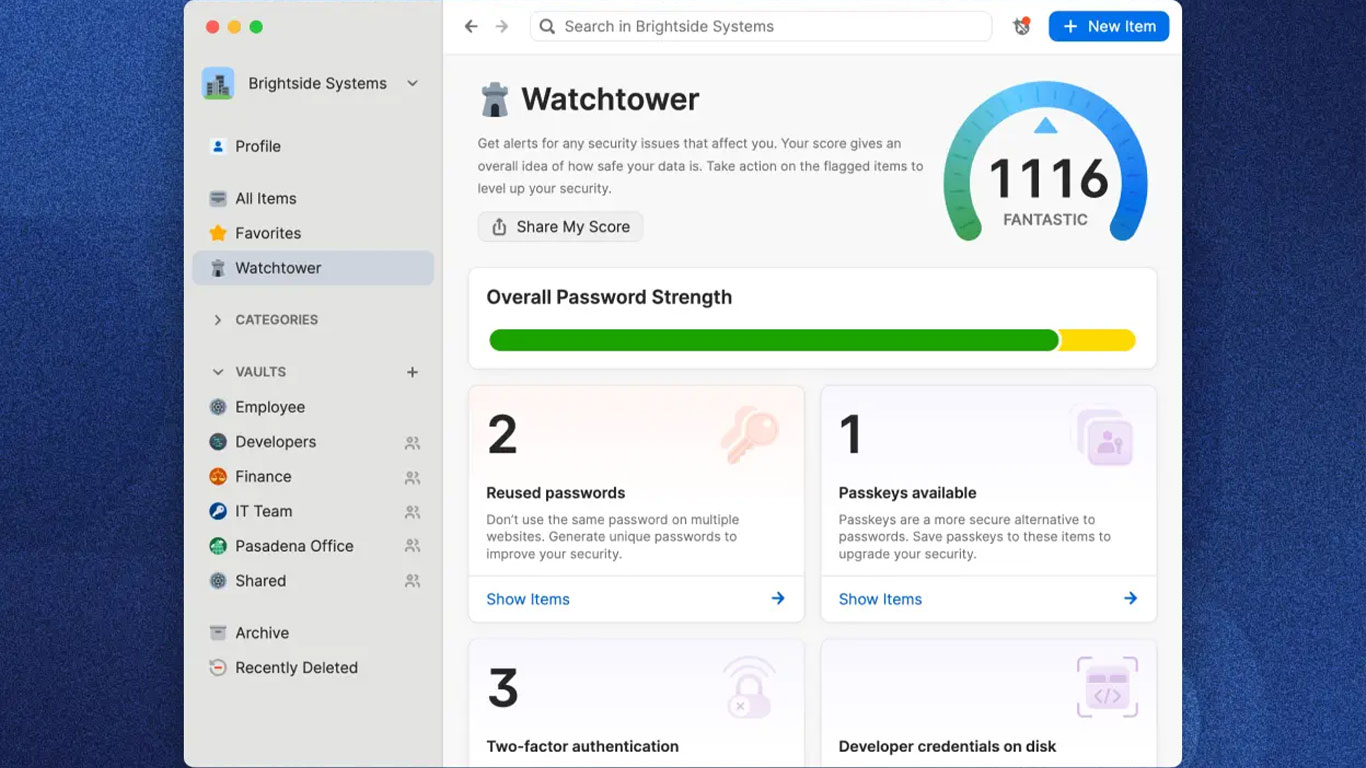Using a password keeper like 1Password is increasingly recognized as a critical step for safeguarding your digital life. Here’s an in-depth look at why you should consider embracing password managers, their top advantages and disadvantages, and which users benefit most from their adoption.
The Password Problem
Almost everyone interacts with dozens of websites, apps, and online services that need secure logins. The frequent advice from cybersecurity experts—use unique and complex passwords for each account—is clear. However, this quickly becomes overwhelming to maintain manually, and most people end up reusing passwords, writing them down, or relying on easily guessed solutions. This widespread problem presents a golden opportunity for cybercriminals who exploit human vulnerabilities and weak password practices to access sensitive information.
The Top Three Advantages of Password Managers
Enhanced Security
The first and most compelling benefit is enhanced security. Password managers like 1Password employ powerful encryption technologies, including AES 256-bit and zero-knowledge architectures, to guard every stored credential. These applications automatically generate strong, complex, and unique passwords for each account, drastically reducing risk from attacks that thrive on reused or weak passwords. By auditing stored passwords, managers can alert users to any weak, reused, or compromised credentials, enabling them to take immediate action and prevent breaches.

Additionally, the use of two-factor authentication (2FA) and secure file storage options creates deep layers of defense against unauthorized access and identity theft. For businesses, security extends to protecting shared credentials and sensitive files from phishing and insider threats.
Convenience and Efficiency
Password managers are not just about security—they’re about making life easier. With 1Password, users only need to remember one master password to access all their accounts. Features like autofill and secure synchronization across devices save time and frustration, especially when logging into busy online services or switching between work and personal accounts. Convenience is further enhanced through automatic password generation, which eliminates the need to create strong passwords for each new account.
Multi-device support is essential in today’s connected world. Leading password managers allow users to access their vaults from smartphones, desktops, tablets, and browsers alike, regardless of their location or operating system. This seamless experience helps avoid password resets, lost logins, and locked-out accounts that interrupt productivity.
Better Password Habits
A subtle but significant benefit of password keepers is how they promote and enforce better password hygiene. By generating strong passwords and centralizing storage, users are discouraged from resorting to unsafe shortcuts, like using “123456” or their pet’s name across every login. Password managers highlight weak passwords and encourage regular updates for compromised credentials, which is vital in an era of frequent data breaches and dark web leaks.
Managers frequently offer additional tools such as password health reports, breach monitoring, and secure password sharing, all of which reinforce robust security habits for both individuals and teams.
Three Major Disadvantages of Password Managers
Reliance on a Single Point of Failure
A common concern is that password managers become a “single point of failure”—if the master password is lost or compromised, access to all saved credentials may be jeopardized. While most services offer recovery mechanisms, these extra steps can be complex or daunting for new users, increasing anxiety over lockouts.
Security experts recommend using multi-factor authentication and secure recovery options to minimize this risk; however, the reality is that one lost or weak master password can compromise even the strongest system, underscoring the importance of choosing a reputable provider and setting up backup tools.
Potential Cost
Quality comes at a price. While some password managers offer free plans, advanced features—such as dark web monitoring, family sharing, secure file storage, and multi-device support—are usually reserved for paid subscribers. This can add up, especially for businesses or families needing to secure dozens of accounts.
Some users may prefer free browser-based managers but should be aware that these often have limited functionality and weaker security practices compared to stand-alone applications such as 1Password. It’s vital to balance cost considerations with the protection offered, remembering that the expense is small compared to the cost of identity theft or business breaches.
Compatibility and Usability Issues
Though password keepers are designed to be intuitive, there are occasional compatibility headaches. Not all managers work perfectly across older browsers, custom apps, or rare operating systems. Occasionally, autofill features miss a field or require manual intervention, which can frustrate users unfamiliar with troubleshooting digital tools.
While most platforms offer robust customer support and plenty of onboarding guides, less tech-savvy users may struggle during initial setup or when navigating advanced features. Continual software updates and patches are necessary to maintain functionality and security, so users should stay informed and engaged with their chosen manager.
Who Benefits Most from Using Password Keepers
Busy Individuals and Families
Anyone juggling multiple devices, online identities, and accounts stands to benefit enormously. Families with children or seniors can securely share logins to streaming services or educational apps without ever exposing actual passwords. Parents can monitor password health and quickly help children recover forgotten credentials, reducing stress and interruptions.
Businesses, Remote Teams, and Travelers
Organizations—especially those with remote or hybrid teams—benefit from centralized password management, secure credential sharing, and regular security audits. Managers can ensure every employee follows best practices and can rapidly revoke access when someone leaves the team. Travelers, meanwhile, benefit from mobile vaults and security features such as “Travel Mode,” protecting sensitive credentials even during border crossings.

Security-Conscious Users
Anyone concerned about privacy, data breaches, identity theft, or simply wanting peace of mind will find immense value in password keepers. By automating secure password generation, monitoring for violations, and keeping credentials encrypted even during device theft or loss, these tools provide a vital bulwark against contemporary cyber threats.
Conclusion
Password keepers like 1Password have revolutionized online security by striking a crucial balance between convenience and robust protection. With powerful encryption, seamless usability, and comprehensive password health tools, they’re essential for individuals, families, and organizations alike. While there are minor trade-offs—cost, reliance on a master password, and occasional compatibility glitches—the net benefits overwhelmingly favor anyone seeking to improve digital security. For those tired of the stress and risk associated with fragile password habits, the time to adopt a password manager is now.

